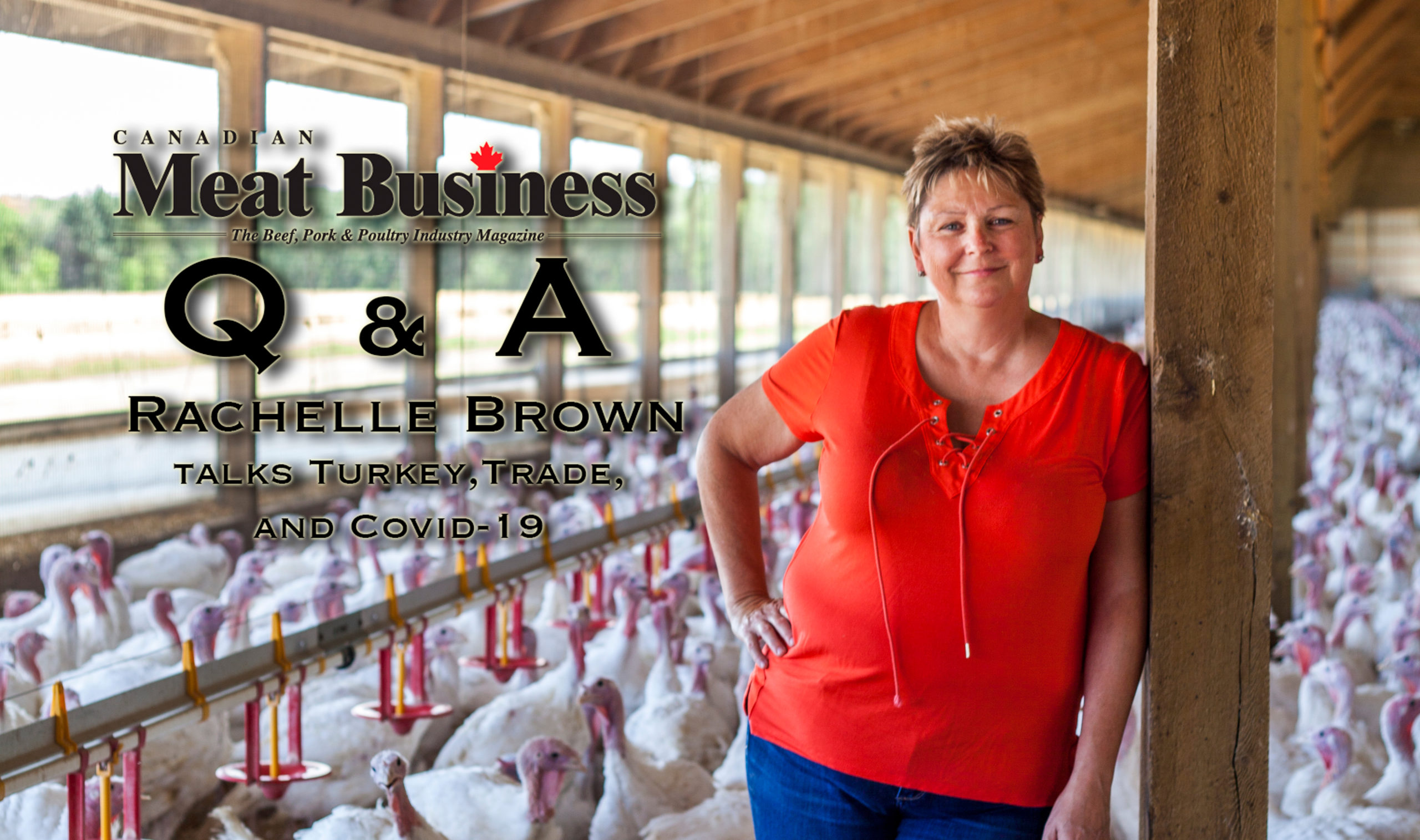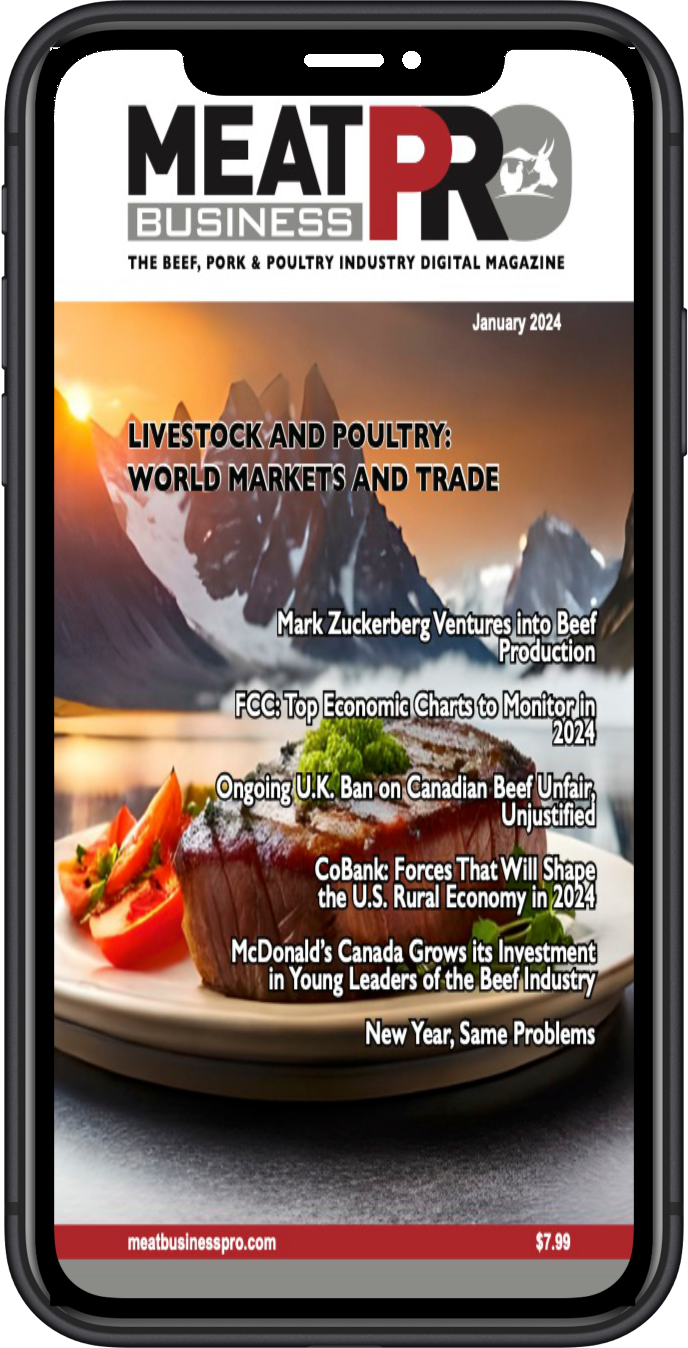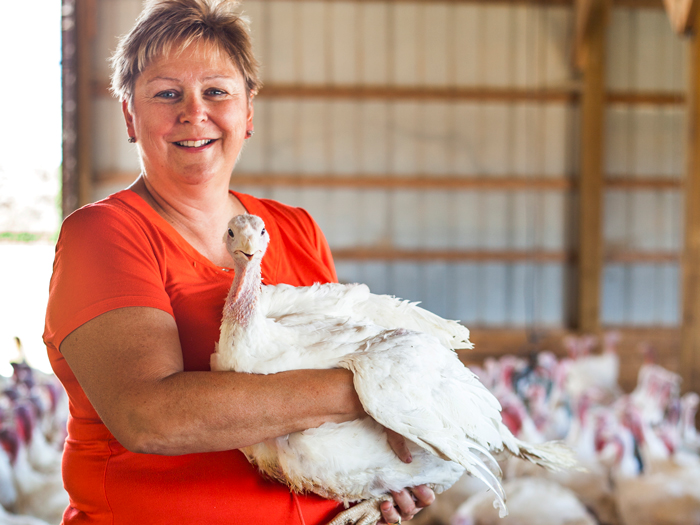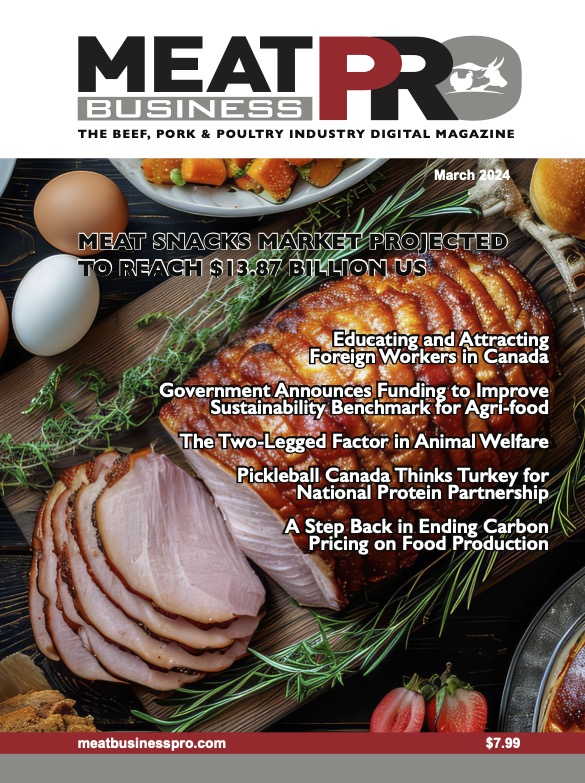Our Latest Q&A: Talking Turkey with Manitoba Turkey Producers’ Rachelle Brown

Rachelle Brown is the Chair of the Manitoba Turkey Producers and is currently serving her fifth consecutive three-year term. She is also Manitoba’s director to the Turkey Farmers of Canada, having served in the role for the last 10 years
by Cam Patterson
Rachelle and her husband, Martin are generational turkey farmers living north of Winnipeg. Martin’s parents started the farm more than 50 years ago, and Martin and Rachelle decided to take it over when they retired. It’s a typical story for most turkey farmers in Canada and Rachelle states proudly that a lot of turkey producers are third and fourth generation farmers.
Canadian Meat Business (CMB) has been keen to speak with Rachelle Brown (RB) in the past and with the unprecedented pandemic hitting us in 2020, this was the right time to conduct our in-depth Q&A.
“I have faith the industry will turn around, we just have to give it time as we’ve been hit on many fronts including a pandemic we weren’t expecting and trade agreements that have increased market access”
CMB: Let’s start with the impact of COVID-19 and how you see them as both a farmer and a board member on the turkey industry in Canada?
RB: From a personal perspective my husband Marty and I follow the bio-security protocols that all turkey producers adhere to, there typically isn’t a lot of coming and going on the farm. So in that respect, COVID-19 hasn’t really changed much because we operate in our own little bubble anyway. What has changed is accessibility to supplies and feeds, equipment and parts, those types of things, due to the unprecedented shut downs the pandemic has brought about. I would say the individual farmer has been struggling a little more with that during the pandemic than the isolating aspect of it for sure. Now speaking on an industry impact perspective, and specifically on turkey farmers across the country, we have all been hugely affected as a result of COVID-19. We have been cut back 10 million kgs due to the pandemic alone.
CMB: I’m guessing that is on top of the market access cutback that was already brought about by the trade uncertainty.
RB: Yes. The CPTPP and CUSMA tier access coming in is very concerning for us. Our storage stocks were already on the high side, so we cut 10.6 million kgs at the beginning of the control period back in February/March. We made that decision because of the TRQ (Tariff Rate Quota) coming in with all the trade agreements. So move up a month and now COVID-19 hits and our restaurants and retail are closing down everywhere. We had no choice but to cut another 10 million; that’s an unprecedented 20 million kgs cut across the country this year.
CMB: That’s a devastating decrease and begs the question, how can the turkey industry survive this lockdown?
RB: It affects the entire industry from hatchery, feed and equipment supplier to processor, and farmer. That’s a huge impact on turkey farmers because now you’re growing a lot fewer birds yet all your fixed costs are still the same. So now, we’re looking for ways to cut costs without negatively effecting your daily operations.
CMB: Can you give me an example of what you changed on your farm?
RB: We decided to go a little “old school” with our bedding option. We used to get wood shavings, which is a little pricey, but this year we’re doing straw. It’s something we can get locally. And then we bought an old manure spreader and straw bales to bed-down our barn and pole-barn. That was one way for us to mitigate costs to some degree.
We’re also not renovating or updating equipment this year because we’ve basically adopted a “make-it-do” philosophy. It’s like any other business operation, when your budget is low you take a hard look at what you really need to do, what needs repairing or replacing, and making sensible decisions on what you can make work a little longer. That is the position, as farmers, we are all in.
COVID-19 also has a ripple effect that plagues our entire industry because it’s not just us on the farm. It’s the entire supply chain. For example, the hatchery here in Manitoba is the largest hatchery in Western Canada, but when you’re cutting 20 million kgs, you’re cutting a lot of eggs that would typically come out of that hatchery. So, it’s fair to say, aside from the personal loss and health concerns of COVID-19, from a farming stand-point, the real impact has been on our bottom line, as can be said for every Canadian and every industry out there.
Rachelle Brown and her husband, Martin are generational turkey farmers living north of Winnipeg.
CMB: Would you say the $250 million in government livestock aide is sufficient to get the industry through the pandemic?
RB: A lot of the programs look good on paper but when it trickles down to the farmer, it is some monetary relief, but in all actuality doesn’t really end up helping all that much.
CMB: Is the aide that is coming timely enough to save chicken and turkey farmers?
RB: It’s important to note that the turkey industry is not like the chicken industry. Chickens turn around every 30 days where turkeys turn around every three to four months. That’s the difference between our two sectors. Chicken farmers can cut back and rebound quicker, because their flocks are on a monthly basis, whereas, we’re looking at a longer cycle to cut back, so we can’t just stop production right then and there. When we say you’re going cutback it’s four or five months down the road before you actually start seeing the impact. So, with respect to these cutbacks from the TRQ and COVID, we are just starting to see the impact. But we will definitely notice it this winter. And that’s where turkey farmers really feel it, because if you cut production, you’d cut it when it cost you the most to grow – and that is during the winter.
CMB: In your role as Chair, how do you see the board’s role going forward during this unprecedented time?
RB: Our levies come from our producers according to how many kgs their farming. So when COVID-19 hit and our allocation got cut, so did our levy and subsequently our budget shrinks. As a board, we have to re-evaluate our operating costs but in reality the only fluid aspect we absolutely have to maintain is the marketing. I say that because in my opinion, “when times are tough, you should do more marketing.” But when you don’t have the dollars that is ultimately cut back as well.
In Manitoba, our “on farm safety audits” were suspended and we are looking at possibly doing virtual “record review only” as we’re not letting our auditors go onto farms during the pandemic. This is impactful for us because the Farm Safety Program and the Flock Care Program are very important aspects of turkey production in Manitoba. The programs present a strong selling point for retailers and consumers to verify that the sustainability and non-antibiotic boxes have been checked off for the flocks we raise and sell.
That said, as a board member, I’m proud that we are doing what we say we’re doing and producers get audited every year to make sure every farmer is online with our standards. But with COVID-19, this has been a main issue at the office. How do we fulfil this mandated program when we can’t risk physical farm audits. So, like the rest of the world, we’ve adopted new tech and Zoom has become the way we carry out “online” communication which has allowed us to continue on the business side of operations. We had to alter our methods of how we do it accordingly to match the reduced levies coming into the board office.
CMB: Is the national board faced with the same challenges as well then?
RB: Absolutely! For example, we still want to carry on with our five year, $5 million dollar national marketing campaign, Think Turkey. We had just finished year one. Think Turkey is an aggressive marketing strategy using national TV ads, billboards as well as comprehensive social media roll-outs. The campaign is impressive and we’re getting a lot of good feedback on it, so as a result, we’ve adjusted the plan accordingly. As for our mandates, our board has to figure out how to have an AGM and be able to connect with everybody. We still have to have a conversation on what markets are doing and, for example, how CUSMA is going to affect us all.
CMB: It seems like all the trade deals are in limbo. What is most concerning for the turkey farmer in Canada?
RB: The last I heard from the national office, Chile had yet to ratify the CPTPP. The CPTPP and CUSMA will bring added access to our market. A combination of both means a doubling of access from 5.6 million kgs to over 9 million kgs of product coming into our country. This amount of imported meat is a huge problem as our storage stocks are already on the high side. The only way to mitigate this is by cutting back allocation to Canadian farmers.
CMB: How can you forecast anything when President Trump is such a wildcard?
RB: You do your best! We’ve already ratified CUSMA so all we can do is work under the assumption that we’re going to move along with what we’ve already got.
CMB: The pork and cattle sectors have been hit hard throughout the pandemic with processing plants being forced to close or cut back operations. How has processing been affected in the turkey sector?
RB: We’ve been lucky as our processing plants didn’t have to close. They mitigated any issues. But the cost was astronomical when you consider the PPE, installation of protection barriers, and employee incentives and plant expansion – larger lunch rooms for instance – to comply with new social-distancing directives. But we were able to keep operations open.
CMB: Is Exceldor still the only turkey processing plant in Manitoba because of the amalgamation with Granny’s in 2019?
RB: Yes, if Exceldor would have closed, I have no idea what producers would’ve done. I’m glad we didn’t have to go that route. The management and staff at Exceldor have done a great job in communicating with producers as to all the steps they have taken to maintain operations and have a safe environment for all staff.
CMB: How did the Wish Bone Project come about?
RB: The COVID-19 pandemic did bring about the Wish Bone Project because so many people had lost their jobs with many more going hungry. We were sitting on surplus inventory so it just made sense to help. The idea came about through the marketing company, Zeno, who we work with on our Think Turkey campaign.
CMB: This project is also sponsoring Kid’s Help Phone as well?
RB: When we learned Kid’s Help Phone “call-ins” had increased 300%, we reacted. Kids are always vulnerable during a pandemic especially when schools get closed. There is a lot of anxiety for kids as a result, so we as a board collectively, decided to help out. We also made a monetary donation to 4H because their program has a great reach to a lot of kids in rural communities. Also every provincial turkey association in the country has also made their own donations, through the Wish Bone Project, to organizations specific to their home province.
CMB: As Chair pf the provincial board, and as a member of the national board, how would you sum up 2020 and what your hope is for 2021?
RB: 2020 has been challenging. COVID-19 seemed to come out of nowhere and hit us so hard and fast. My hope for 2021 is to maintain, because I don’t feel we’re going to be out of this anytime soon. This is not going to go away at this point but I believe we can keep the curve flattened and keep the numbers low. That would be a success for us. That would be my wish.
CMB: As a turkey farmer, how would you personally summarize the state of this industry?
RB: That I have faith the industry will turn around, we just have to give it time as we’ve been hit on many fronts including a pandemic we weren’t expecting and trade agreements that have increased market access. Supply Management has typically been used as the bargaining chip for trade negotiations. But, that said, I’m hoping three to four years down the road, COVID-19 is well behind us and market access will level off and we can get back to moving forward again. We will rebound. Farmers are very resilient. We don’t give up easily. But we do have to embrace the new way of doing business in the post-pandemic, digital communicating world. But, yes, I absolutely have faith we will get through it.












